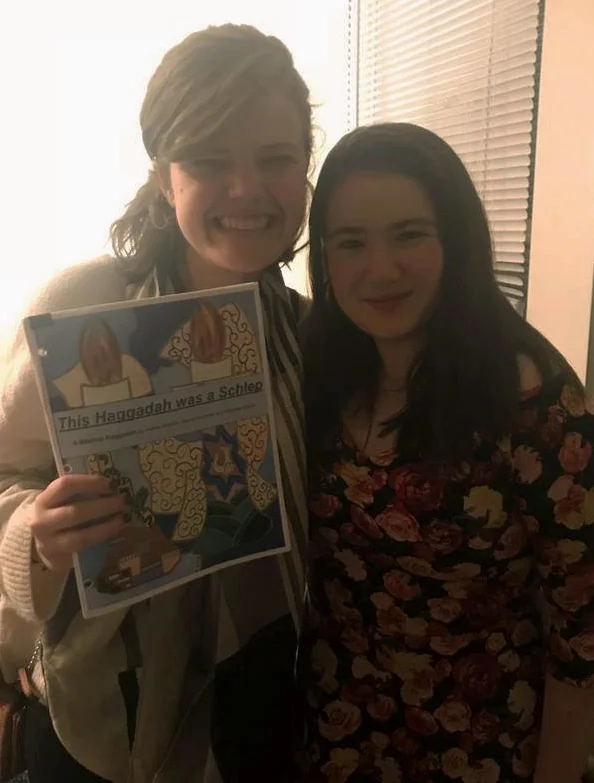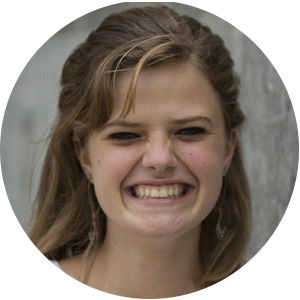How My First Seder Reinvigorated My Work
I was reminded during these Seders how community building is a key component of repairing our world. I observed how a group of strangers and friends can collectively share a deep commitment to making this world a more socially just and equitable place. [The Seder was] a chance to pause, brainstorm, and envision ways that we can create a better and safer world for everyone with the guidance of Jewish texts and each other.
By Erin McMullen
Tikkun olam --- it’s a two-word phrase with a profound meaning that has stuck with me since I read it in the haggadah at my first Passover Seder this month. Usually translated “repair the world”— the need for tikkun olam surrounds us as every day as we’re bombarded with news headlines about school shootings, women murdered by their abusive partners, police brutality that disproportionately impacts people of color and trans individuals, and the pervasive debate of who does—and who doesn’t—deserve rights and access in our country. Our world is broken in many ways, but an important takeaway from my first Passover Seder is that community, resilience, and compassion are not only key values within the Jewish community, they are also values that every community deeply needs, now more than ever.
To give some context, I am not Jewish, but have had the opportunity to be warmly embraced by my work family at Jewish Women International since I came here in April 2017. It’s been an enlightening year. I’ve loved learning new phrases daily, trying new (and very delicious!) food, and gaining valuable insights about core values of the Jewish faith. I do admit that I have inadvertently incorporated new words into my daily vocabulary outside of work: I often tell my kitten that he has some schmutz on his face during his dinners! So when I was invited to two Seders for Passover this year, I was eager to attend. I came away from them with an even deeper sense of community as well as a plethora of questions to ponder about how we can collectively work towards achieving social justice.
During these Seders, I was poignantly reminded of the importance of JWI’s work and how our organization fully embraces the meaning of tikkun olam. We are quite literally repairing the world by supporting and championing the rights of all women and girls at nearly every stage of their lives. We build children’s libraries in domestic violence shelters so they too can experience the joy of reading and stay on track in school. We teach college students financial literacy skills so they know how to save and use credit wisely and feel confident about negotiating their first salary after graduation. We facilitate conversations about healthy relationships and equip students with skills to change campus culture that all too often leads to sexual assault. Young professional Jewish women can join our Young Women’s Leadership Network that champions the importance of professional and personal mentorship, leadership, and civic engagement. When JWI advocates on Capitol Hill we are fighting for the rights of all women and girls and breaking down the barriers that can hinder their chance to live safely and thrive.
JWI acknowledges that in order to repair our world, we have to be intersectional in our approaches: The issues that plague our world are interconnected. Gun violence and domestic violence, for example, are linked, and cannot be prevented without addressing them together.
In addition to feeling even prouder than I already was to work for a mission-driven organization, I also was reminded during these Seders how community building is a key component of repairing our world. I observed how a group of strangers and friends can collectively share a deep commitment to making this world a more socially just and equitable place. Through the haggadah’s framework we were able to discuss the Ten Plagues and also identify additional plagues that we see throughout our daily lives. This was also a chance to pause, brainstorm, and envision ways that we can create a better and safer world for everyone with the guidance of Jewish texts and each other.
I am deeply thankful for these opportunities to learn more about the Jewish faith. I left my first Passover experience with a renewed sense of purpose, a happy stomach from delicious Seder dishes, and an affirmed commitment to healing our world alongside a community of incredibly passionate individuals. Together, we envision a world where all women and girls are safe, empowered, and thriving. On that note I offer this excerpt from Numbers 12:13, in which Moses asked for healing of his sister Miriam: Ana El na, refa na lah. Ana El na, refa na lah. I ask the Power of Love, please heal her. I ask Power, please heal her.
Erin McMullen is the Development Coordinator for JWI. When she isn't exploring all the live music and noms that DC has to offer, she's probably fighting off "love bites" from Cooper the cat.


